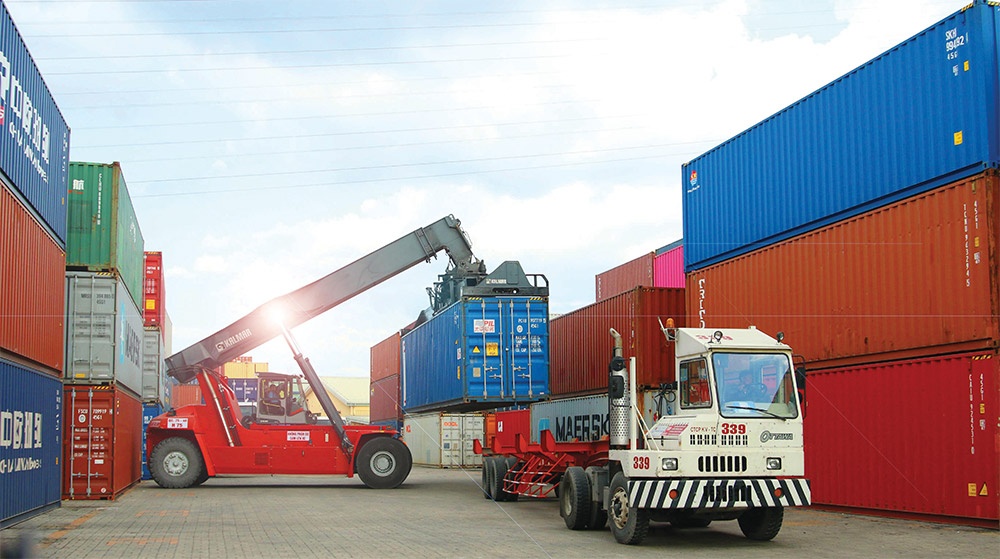INTERNATIONAL INVESTMENT
AND PORTAL
 Various operational aspects are being transformed with tech upgrades such as AI, photo Le Toan
Various operational aspects are being transformed with tech upgrades such as AI, photo Le Toan
At a seminar on sustainable development of logistics in the 4.0 era in Hanoi at the end of April, organised by the Ministry of Industry and Trade (MoIT), Vu Khac Anh, director of cross-border e-commerce company Pervasel, said that his business currently processes around one million orders in the US market.
“With a global operational scale, technology is indispensable in all aspects of management. From human resource management, advertising, logistics, to customer service, everything must be digitised,” explained Anh.
Currently, Pervasel uses AI to operate 24/7 automated response systems in multiple countries, significantly reducing labour costs. At the same time, it is training AI to forecast fashion trends in different countries, allowing the company to develop products tailored to each market, Anh added.
“The utilisation of big data and AI not only shortens product development time for Pervasel, but also significantly enhances operational efficiency and responsiveness to market fluctuations,” Anh said.
Dr. Nguyen Tien Minh, an expert in logistics, told VIR that using AI is a necessity for the logistics industry. It enables businesses to forecast demand, optimise warehouse operations, and coordinate transportation more efficiently, he said.
“However, implementing it requires substantial investment and a digitally skilled workforce, something many small and medium-sized enterprises still lack,” Minh explained. “The second half of the year is a pivotal time for Vietnam’s logistics sector to transform. Businesses must act quickly, invest in technology and people, and form strategic partnerships to overcome challenges and seize growth opportunities.”
Dr. Nguyen Thi Xuan Hoa, deputy head of Research at the Vietnam Association for Logistics Manpower Development, believes that AI is an effective tool when used properly.
“In our research, we use AI tools like Google Notebook to process and analyse big data. When used correctly, AI can significantly boost productivity and accuracy,” Hoa noted. “However, as powerful as it is, it still requires human oversight, leadership, and validation.”
Meanwhile Tran Thanh Hai, who is deputy director of the Foreign Trade Agency under the MoIT, said that the logistics industry must transform and capitalise on economic recovery and tech advancement.
“However, for sustainable development, businesses need to proactively adapt, invest in technology and human resources, and collaborate closely with partners to overcome challenges and capture opportunities,” Hai said.
To encourage the application of AI in the logistics industry, Hai emphasised that logistics enterprises need to develop a digital transformation strategy, clearly define digital transformation goals, and establish a roadmap tailored to their own operations.
“Within this strategy, businesses must identify specific technological applications, including AI, across various aspects of their operations,” he added.
In addition, the choice of a technology application model within the enterprise should be carefully researched. “Enterprises should foster strong internal connections within the logistics sector and seek advice from digital transformation service providers to help determine the most suitable approach,” Hai said.
Finally, businesses must ensure that the transition to technology-based operations is carried out steadily, following a roadmap that aligns with each company’s actual capabilities.
“Companies should also clearly define the objectives of software applications, with a primary focus on enhancing customer experience, ensuring accurate, real-time information retrieval, and supporting internal management operations,” he added.
Vietnam’s logistics market in the second half of 2025 is expected to continue its strong growth. According to the MoIT, the country currently has over 40,000 enterprises operating in the logistics sector, with an average annual growth rate of 12–14 per cent. The market size has surpassed $60 billion, making logistics a key pillar in Vietnam’s integration and economic development strategy.
 How Vietnamese logistics can contend with shifting global supply chains
How Vietnamese logistics can contend with shifting global supply chains
In the midst of uncertain trade tensions, among ASEAN countries, Vietnam continues to stand out as one of the most attractive logistics markets.



















